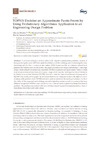Identificador persistente para citar o vincular este elemento:
https://accedacris.ulpgc.es/jspui/handle/10553/77156
| Título: | TOPSIS decision on approximate pareto fronts by using evolutionary algorithms: Application to an engineering design problem | Autores/as: | Méndez Babey, Máximo Frutos, Mariano Miguel, Fabio Aguasca Colomo, Ricardo |
Clasificación UNESCO: | 3307 Tecnología electrónica 120304 Inteligencia artificial |
Palabras clave: | Multi-Objective Evolutionary Algorithms Multiple Criteria Decision-Making Optimization Preferences TOPSIS, et al. |
Fecha de publicación: | 2020 | Publicación seriada: | Mathematics | Resumen: | A common technique used to solve multi-objective optimization problems consists of first generating the set of all Pareto-optimal solutions and then ranking and/or choosing the most interesting solution for a human decision maker (DM). Sometimes this technique is referred to as generate first–choose later. In this context, this paper proposes a two-stage methodology: a first stage using a multi-objective evolutionary algorithm (MOEA) to generate an approximate Pareto-optimal front of non-dominated solutions and a second stage, which uses the Technique for Order Preference by Similarity to an Ideal Solution (TOPSIS) devoted to rank the potential solutions to be proposed to the DM. The novelty of this paper lies in the fact that it is not necessary to know the ideal and nadir solutions of the problem in the TOPSIS method in order to determine the ranking of solutions. To show the utility of the proposed methodology, several original experiments and comparisons between different recognized MOEAs were carried out on a welded beam engineering design benchmark problem. The problem was solved with two and three objectives and it is characterized by a lack of knowledge about ideal and nadir values. | URI: | https://accedacris.ulpgc.es/handle/10553/77156 | ISSN: | 2227-7390 | DOI: | 10.3390/math8112072 | Fuente: | Mathematics [EISSN 2227-7390], v. 8 (11), 2072, (Noviembre 2020) |
| Colección: | Artículos |
Citas SCOPUSTM
22
actualizado el 08-jun-2025
Citas de WEB OF SCIENCETM
Citations
28
actualizado el 22-feb-2026
Visitas
124
actualizado el 10-ene-2026
Descargas
63
actualizado el 10-ene-2026
Google ScholarTM
Verifica
Altmetric
Comparte
Exporta metadatos
Los elementos en ULPGC accedaCRIS están protegidos por derechos de autor con todos los derechos reservados, a menos que se indique lo contrario.
